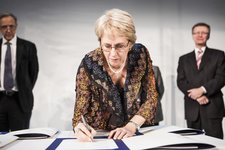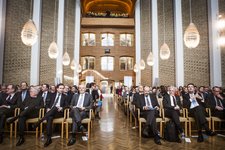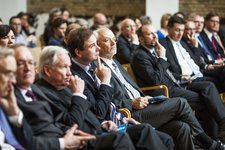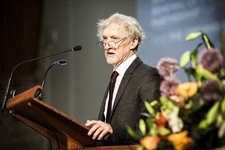Lundbeck Foundation centre in Aarhus for top European Brain Research
The European Molecular Biology Laboratory (EMBL), Europe’s flagship laboratory for the life sciences, is now joining forces with Aarhus University as its Danish partner of the Nordic EMBL Partnership for Molecular Medicine. On the initiative of the Lundbeck Foundation, a new elite research centre – DANDRITE – is to form the prestigious setting for top level international research in the field of neuroscience, backed by an anticipated DKK 500 million.
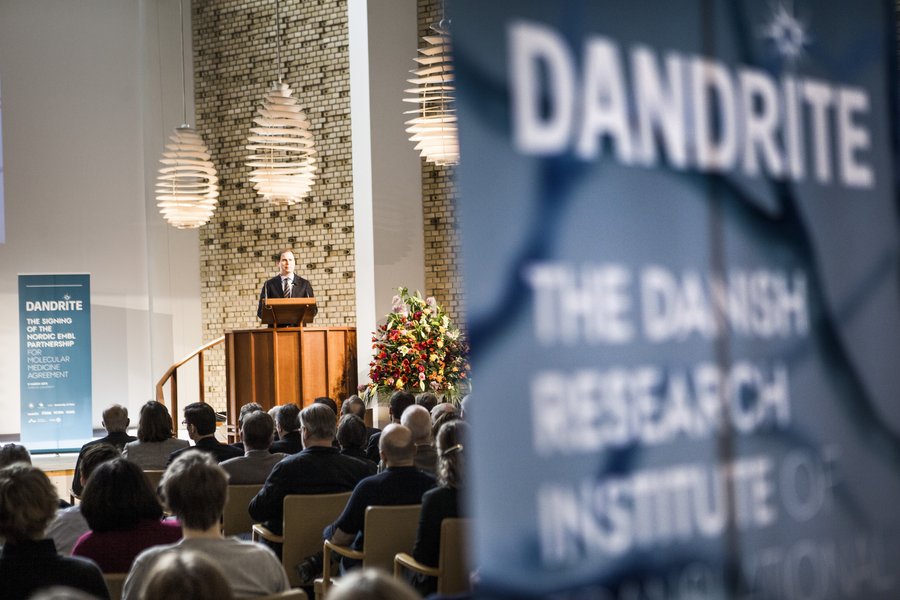
Neuro-research in Denmark will receive a welcome boost with the opening of a new and ambitious research centre at Aarhus University. Backed by a prestigious, European partnership and a substantial grant, the new centre will enjoy excellent opportunities to generate knowledge that has a significant impact.
This is set to happen when EMBL Europe’s flagship laboratory for the life sciences, joins forces with Aarhus University as its Danish partner of the Nordic EMBL Partnership for Molecular Medicine. Denmark will thus be joining the Nordic EMBL partnership for Molecular Medicine on equal footing with Finland, Norway and Sweden, which was established in 2007.
The renewal of the partnership agreement for an extended period of 10 years and its expansion through the establishment of the Danish Node -DANDRITE - was celebrated at Aarhus University today, March 5. The inauguration of DANDRITE, the Danish Research Institute of Translational Neuroscience, which is intended to make Aarhus a magnet for top level international research in the fields of molecular and translational neuroscience was thus one of the highlights of the ceremony. The establishment of the centre was made possible through the Lundbeck Foundation initiative to set up a node part of the Nordic EMBL Partnership for Molecular Medicine in Denmark, and the international expert assessment was performed jointly by the Danish Council for Independent Research and the Lundbeck Foundation.
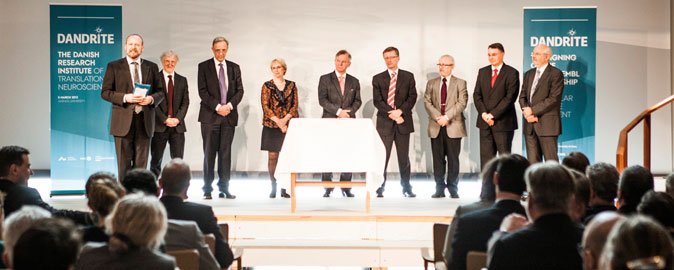
From the launch of DANDRITE, the Danish node in the EMBL Nordic Partnership in Molecular Medicine, and the signing of the Nordic EMBL agreement at Aarhus University: From left to right Director Poul Nissen, DANDRITE, Director General Iain Mattaj, EMBL, Rector Thomas Wilhelmsson, University of Helsinki, Rector Lena Gustafsson, Umeå University, Rector Ole Petter Ottersen, University of Oslo, the directors of the other nodes in the EMBL Nordic Partnership Olli Kallioniemi, (FIMM), Bernt Eric Uhlin (MIMS), Kjetil Taskén (NCMM), and Rector Lauritz B. Holm-Nielsen, Aarhus University. Photo: Lise Balsby/AU Kommunikation.
Fourth Nordic partner
Boasting around 85 research groups, EMBL itself has laboratories at five locations in Europe and is considered to be one of the leading basic research institutions in the world in the field of molecular biology. It receives public funding from 20 Member States, most of them European countries, including Denmark and from Australia as associate member state
“We’re excited to welcome Denmark as the fourth partner in the Nordic EMBL Partnership for Molecular Medicine. In a competitive national process, Aarhus University was selected to host the Danish node. The decision was made on the basis of the university’s scientific expertise in the neurosciences and its research environment, which offer an excellent base for building a world-class collaborative institute like DANDRITE,” says Iain Mattaj, Director General of EMBL.

New centre to become international magnet
At Aarhus University, Rector Lauritz B. Holm-Nielsen views EMBL as an exceptionally valuable partner for researchers:
“The partnership will generally boost Danish neuro-research and its global working relationship in the research sector. As a national EMBL partner, Aarhus University is also prepared to give DANDRITE – its new research centre that can trace its roots back to Jens Christian Skou, our Nobel laureate – the financial backbone required to lay the foundations that will allow the centre to fulfil its high ambitions and make full use of its enormous potential,” he says.
Five new research groups featuring global talents from the international research environment are to be recruited to DANDRITE via open job advertisements in a transparent process involving both EMBL and the other partnerships. The talents will have the opportunity to build up their own groups and give free rein to their expertise at Aarhus University over the coming 5-9 years.
It is expected that funds in the amount of almost DKK 500 million will flow into DANDRITE, comprising funding from Aarhus University itself and from external foundations.
The Lundbeck Foundation has pledged DKK 60 million over five years to the centre, with the option for an additional DKK 60 million over the next five years.
"EMBL is one of the finest molecular biology environments in the world, and is famous for its operational model that includes international recruitment of young researchers, turn-over system , dynamic working environment, regular quality reviews, and its superior scientific productivity,” says Mikael Rørth, Vice President of the Lundbeck Foundation.
”In 2007, EMBL, together with Finland, Norway and Sweden, established the Nordic EMBL Partnership for Molecular Medicine with a national node in each of the three countries – a partnership complementing the individual research strengths of the three Nordic countries that has successfully implemented EMBL operational model in the Nordic region and generated valuable networks. The Lundbeck Foundation is proud to be able to bring Danish neuro-research into this unique working relation through the establishment of another EMBL node of the Nordic EMBL Partnership in collaboration with Aarhus University. The Lundbeck Foundation strives to support health sciences in Denmark in a visible and sustainable manner, and considers this initiative in particular to be making an extremely important, future-oriented contribution to reinforcing Danish neuro-research.”

Aims to be first with the latest ideas
At DANDRITE, Aarhus University researchers will be working to unravel the signal processes in the brain that impact our life processes – particularly those associated with neurological and psychiatric disorders. The work will be carried out in close collaboration with research groups both in Denmark and abroad. Simply put, researchers will be investigating how patterns arise in the communication between the different parts of the brain, what goes wrong with this communication when we fall ill, and what can be done to develop pharmaceuticals and treatment processes for the benefit of patients.
“The partnership with EMBL has arisen from the independent research approach, and DANDRITE has high ambitions, plenty of funding, independence and excellent infrastructure. So our ambition is to be the first with the latest ideas, rather than having to stand on the shoulders of others,” explains Poul Nissen, Director of DANDRITE and Professor of Protein Biochemistry – the man who will be in charge of the work together with Anders Nykjær and Poul Henning Jensen, Professors of Medical Biochemistry, all from Aarhus University.
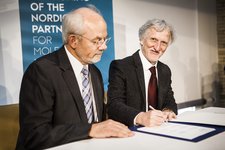
For further information please contact:
EMBL:
Head of Communications, Lena Raditsch, tel. +49 6221 387-8125; lena.raditsch@embl.de
Anne-Marie Engel, Director of Research, tel. +45 3912 8000; ame@lundbeckfonden.dk
Professor Poul Nissen (Director), tel. +45 2899 2295; pn@mb.au.dk ; Professor Anders Nykjær tel. +45 2899 2384; an@biokemi.au.dk ; Professor Poul Henning Jensen tel. +45 2899 2056; phj@biokemi.au.dk
EMBL: The European Molecular Biology Laboratory is a basic research institute funded by public research monies from 20 member states (Austria, Belgium, Croatia, Denmark, Finland, France, Germany, Greece, Iceland, Ireland, Israel, Italy, Luxembourg, the Netherlands, Norway, Portugal, Spain, Sweden, Switzerland and the United Kingdom) and associate member state Australia. Research at EMBL is conducted by approximately 85 independent groups covering the spectrum of molecular biology. The Laboratory has five units: the main Laboratory in Heidelberg, and Outstations in Hinxton (the European Bioinformatics Institute), Grenoble, Hamburg, and Monterotondo near Rome. The cornerstones of EMBL’s mission are: to perform basic research in molecular biology; to train scientists, students and visitors at all levels; to offer vital services to scientists in the member states; to develop new instruments and methods in the life sciences and to actively engage in technology transfer activities. Around 190 students are enrolled in EMBL’s International PhD programme. Additionally, the Laboratory offers a platform for dialogue with the general public through various science communication activities such as lecture series, visitor programmes and the dissemination of scientific achievements.
The Lundbeck Foundation: The Lundbeck Foundation is an active industrial foundation established in 1954 by Grete Lundbeck, widow of the founder of Lundbeck. The main objective of the Foundation is to maintain and expand the activities of the Lundbeck group, subsidiaries and portfolio companies through active value-adding ownership. The Foundation furthermore provides grants for scientific research of the highest international quality with ties to Denmark in order to make a significant difference to human health and life. Grants are given based on external peer review and independently of Lundbeck.
In 2012, the Foundation granted DKK 482 million (approximately € 91.4 million) to support research within medical and natural sciences, which is approximately the same amount as in 2011. The Lundbeck Foundation has stepped up its efforts towards young research talents by increasing the number of Lundbeckfond Fellowships.
In addition to its interest in Lundbeck, the Foundation also has controlling shareholdings in ALK A/S and Falck A/S and manages a substantial portfolio of financial investments through Lundbeckfond Invest as well as Lundbeckfond Ventures, which has been established to invest in early stage life science companies and Lundbeckfond Emerge which has been established to invest in commercialization of early scientific results.
